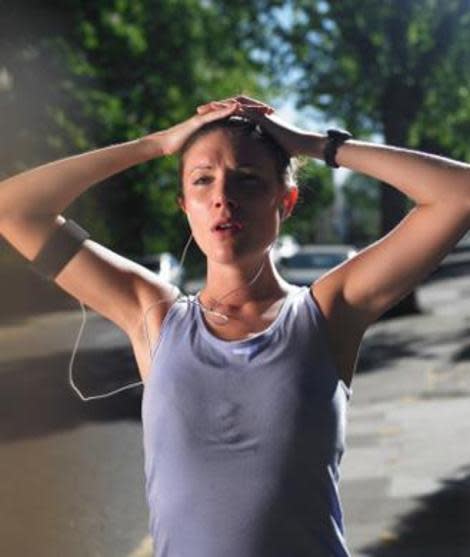Why Does My Workout Suddenly Feel Harder?
by Linda Melone, C.S.C.S, for SHAPE.com

When you're chained to your desk until midnight to meet a deadline or are out even later having fun, you expect to be low on energy and feel it at the gym the next day. But when you bank quality beauty sleep yet every minute on the elliptical seems like an hour, it just doesn't make sense.
The next time you feel as if you're dragging yourself through quicksand, consider these six things that have nothing to do with slumber but could be just the thing that's zapping your zing.
(Note: If none of these apply to you and you're still exhausted, see a doctor to rule out other health issues such as chronic fatigue syndrome.)
1. You're dehydrated: Hot summer days mean you sweat more-and probably need more water than you're sipping, especially if you're exercising outdoors. "If you take a drink of water and find yourself downing the whole glass all at once, you're likely dehydrated," says Jacob Teitelbaum, M.D., a board certified internist and owner of From Fatigued to Fantastic. Since even slight dehydration can cause a drop in energy levels, head off the problem by making H2O your go-to all day. Then drink 2 cups of a cool beverage two hours prior to working out in hot weather, the National Strength and Conditioning Association recommends.
RELATED: The 20-Minute, Do-Anywhere Routine
2. You're overtraining: We're all for hitting it hard during your workouts, but since exercise breaks down your muscles, constantly pushing yourself and training on back-to-back days can break you down. "Your body grows stronger to prepare you for the next workout when you give it time to recover," says Leslie Wakefield, director of women's health programs at Clear Passage Physical Therapy in Miami. If you also have insomnia or develop chronic injuries, you may be overtraining. While the ideal amount of rest varies for each person, plan at least one day of rest and one day of cross-training into your weekly fitness schedule, Wakefield recommends. And if you can't stand to do nothing, gentle, restorative yoga also counts as "rest."
3. You're in a sugar crash: Grabbing carbs for quick energy before your workout could backfire in the middle of Zumba class as you "crash" from the sugar high, Dr. Teitelbaum says. Keep the carbs but choose whole grains and pair them with protein for lasting energy. "Eat one to two hours before your workout, striving for 30 grams of carbs and 15 grams of protein," recommends Mitzi Dulan, R.D., co-author of The All Pro Diet. Think plain Greek yogurt with fresh fruit or 1/3 cup chopped cooked chicken breast in a flatbread.
4. It's that time of the month: Aches, headaches, fatigue-yep, it's PMS. And if you're under a lot of stress or suffer from depression, symptoms may be worse. Typically the plummet in energy starts one to two weeks before your period and stops when bleeding begins. To stay out of zombie mode, avoid sugary foods, eat small meals throughout the day instead of one or two big meals, and talk to your doctor about supplementing with vitamin B6 and magnesium, Dr. Teitelbaum suggests.
5. You're anemic: Your body uses iron to transport oxygen throughout your body so your heart and muscles can give you the energy you need-so if you're lacking oomph, you may be lacking iron and have anemia. The risk is greater if you have heavy periods or do not eat red meat since heme iron is the most readily absorbed form of iron and is only found in animal sources, Dulan says. Even mild deficiencies can cause fatigue during your workout, but talk to your doctor before self-diagnosing because iron overload can also be harmful. If you don't eat meat, lentils, kidney beans, and spinach are good natural sources of iron.
RELATED: 3 Reasons You Don't Lose Fat
6. You're on meds: Although drowsiness and fatigue are common side effects of many over-the-counter (OTC) and prescription medications, some are more likely than others to make you sluggish, says Zara Risoldi Cochrane, Pharm.D., assistant professor of pharmacy practice at Creighton University in Omaha, NE. Antihistamines, commonly used for allergies and in cold medicine, can cause fatigue, even if they say "non-drowsy" on the box. "These medications work by blocking histamines, which help promote wakefulness," Risoldi says. Drugs for anxiety, antidepressants, and some pain medications may also lead to lethargy. If you think your pills are to blame, talk to your pharmacist, who can help you find an alternative medication that won't leave you wanting to curl up in bed instead of go out for a run.
More on SHAPE:
6 Moves for a Rock-Solid Stomach
The Worst Drinks for Your Body
Surprising Facts About Your Muscles
